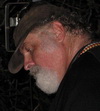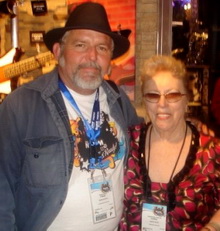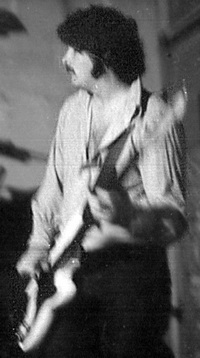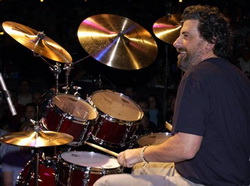| « Only Two Kinds of Musicians in the World | Practice Makes Ready » |
Less Is More, the Importance of Silence
I’m a bass player, at least I’ve been playing at it for four decades now. I’ve tried playing guitar but I have never even been beginning good at it and I always blame my lack of competence on my fat fingers. My fingers just always seemed to mash a couple of strings when chords require individual strings to be pressed precisely. Oh, I could play barre chords all right, but going from an E maj to an F followed by an A min and then a E augmented 7th well, Forgetaboutit! On the other hand, I liked the bass guitar, only four big strings and you played them one at a time, for the most part. Jaco Pastorius I’m not. Heck, Jaco Pastorius I don’t even understand, or Flea for that matter. I can, however, hold down a reasonably solid bass line, or at least I’ve been able to for the last twenty years.
Those first two decades, the frustrated guitar player in me just kept coming out. My problem could be traced back to too much practice with not enough thought. You see, even with fingers that resemble Polish sausages, when you put in 25 to 30 hours a week practicing, you are likely develop a fair amount of manual dexterity. Plus, when you spend your time practicing scales, you’ve developed a lot of dexterity at something that is not too beneficial to being a good bass player.
Carol Kaye would probably want to beat me severely about the head and shoulders with a large acoustic bass for doing that. To quote Carol:
“Why I teach chordal tones instead of unpractical scales is easy to understand: all music song forms are formed around CHORDS, and the bass player has to know how to function in chordal progressions, know what chordal notes to play and how to move them. For decades, I’ve had so many so-called “scale-trained” students come to me for lessons – they can play a god-zillion amount of scales yet cannot play a simple chordal song at all. They don’t even know a simple jazz blues, can’t follow chords with their ears, and have NO IDEA of where their basic chordal notes are, cannot play a simple R35 arpeggio across the neck in *one* position. This belies how terrible those scale-teachers are! Some have even been taking lessons for 2-3 years and could never play ONE TUNE! Astounding and disgusting!”
I wish that she would take a firm position and quit beating around the bush. I wish that I had listened and learned. However, mine were the days of psychedelic rock and roll, and Jack Bruce played lots of scales, didn’t he? Sadly, I didn’t even know enough to understand what he was doing.
I guess that I was really just a frustrated lead guitar player. Every time I encountered a silent spot in the music I’d rush in to fill it with a lick. Two times through a twelve-bar progression and I’d be bored silly with playing the same lines, so I’d scoot up or down the neck and fill it with something that I considered tasty.
I remember auditioning for a band that needed a bassist. As we were jamming I started pecking out the “Star Spangled Banner.” I mean, Hendrix did it, right? At the end the members of the band were all looking at me. I figured they thought I was cool, but they didn’t hire me and it was at least a week before I figured out how stupid I must have sounded. Right then I probably needed to hear the famous Barney Kessel line to a bassist who was always soloing in his playing: “You know, what we both need is a good bass player.”
Eventually I got into doing television work and I didn’t play for a few years. When I came back to the bass I had no calluses, a lot less dexterity and a lot more maturity. I had listened to others and discovered that less really is more and I’d realized the importance of the sounds of silence. Making good music means augmenting the tune, not trying to be the show off.
Drummer Rick Marotta has made a very good living as a session musician with just that philosophy. He’s been a studio drummer with James Taylor, Donny Hathaway, Carly Simon, Hall & Oates, Paul Simon, Stevie Nicks, Roy Orbinson, Todd Rundgren, Quincy Jones, Waylon Jennings, Peter Gabriel, Kenny G., Crosby, Stills and Nash, David Sanborn, Linda Ronstadt, Tom Scott, Boz Scaggs, Toni Childs, and Steely Dan among many others. He also composed the music for the TV shows “Everybody Loves Raymond” and “The Tracy Ullman Show.”
Quoting from a Drum World interview, Marotta said:
“When I was coming up as a musician, there were a lot of truly great drummers like Neil Peart and Terry Bozzio, guys who played a lot of notes and did it very well. But the more notes I heard other guys play, especially in fills, the fewer I would play. At first, it was just a matter of taste, but then I started getting a lot of session calls because of that attitude.” “I bring to composing the same attitude I bring to drumming,” he says. “Simple is usually better.”
These are words of wisdom that have certainly made a stellar career for Mr. Marotta. Of course, he also says that Hendrix was one of his main influences, but I doubt that he ever broke into our nation’s national anthem during a session.
Playing is fun, soloing is great fun, but the song is paramount. Last night I was watching a great bass player with a bunch of his musical friends in concert. They could drag a song on for fifteen minutes with two guitars, soprano sax, keyboards, percussion and bass all intricately weaving through their scales in and out of the changes. They would meet and then separate into sheer virtuosity, coming together again 64 bars later. These folks were stunning and they bored me to tears. Then I punched up a Junior Wells and Buddy Guy show. This wasn’t slick at all, but wow did it have the power to grab and move you and, as the current expression imparts, “That’s What I’m Talking About!”
1 comment
| 5 star: | (1) | |
|---|---|---|
| 4 star: | (0) | |
| 3 star: | (0) | |
| 2 star: | (0) | |
| 1 star: | (0) | |
*****(5.0)
Hey Edward, great insight and a very well written piece, written with a voice and honesty that make it memorable.
And, might I add, packed with some of the most important information any music could ever want.
Cheers buddy
Paul F.

Recent comments
- paul.bourgeois on Last-Minute Gift Ideas and Stocking Stuffers for Guitar Players
- paul.bourgeois on Monday Morning Blues with Dan Grigor and the Green Screen Trio
- Shane O'Brien on Only Two Kinds of Musicians in the World
- Eric Stend on Only Two Kinds of Musicians in the World
- ed.lapple on Only Two Kinds of Musicians in the World
- Paul Fogarty on Less Is More, the Importance of Silence
- dang on Practice Makes Ready
- shanrick on Very Good, Not That Good, Pretty Good




